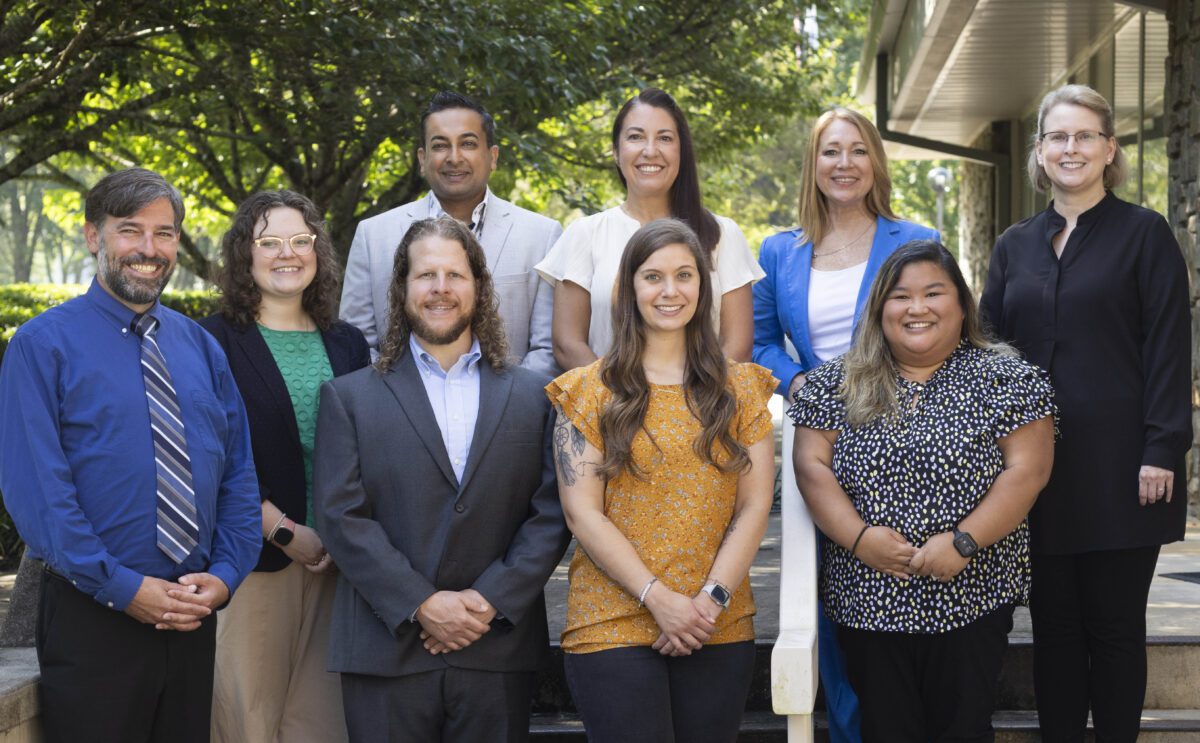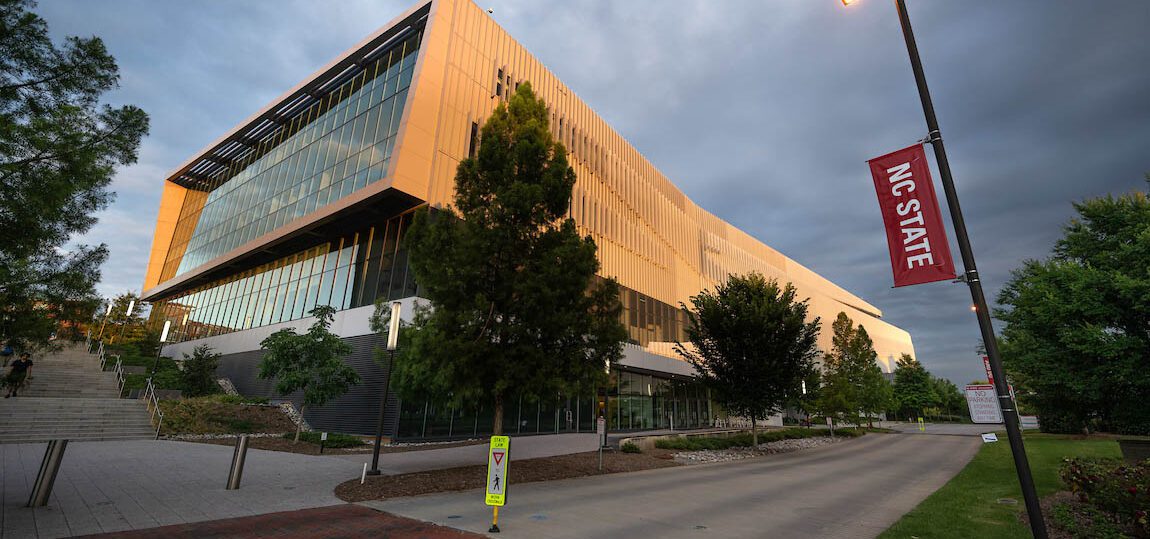RALEIGH, N.C.⸺This summer, nine Kenan Fellows from five school districts spent three weeks at N.C. State University, engaging with researchers across six diverse programs to bridge the gap between classroom lessons and university-level learning.
The NC State EE Lab, N.C. Plant Sciences Initiative, Genetics and Genomics Academy, Teaching Fellows, Innovation and Entrepreneurship Program, and Kenan Institute for Engineering, Technology & Science hosted the K-12 educators at their facilities. Through their immersive experiences, the Fellows developed educational resources to take back to their classrooms and share with colleagues.

Ready, Set, Resilience
Three educators from Carteret County Schools—Rob Condie, Ann Kelly, and Betsy Vorster—spent three weeks collaborating with the NC State EE Lab and the Duke University Marine Lab Community Science Initiative to develop a middle school curriculum. They each contributed lessons to the Marine Lab’s “Ready, Set, Resilience” program, which uses storytelling to connect ecological, personal and social resilience for Carteret County youth who endured two recent hurricanes and the COVID-19 pandemic.
Condie teaches English Language Arts (ELA) to sixth through eighth graders at Broad Creek Middle School. He is an educator with 15 years of experience who plans to build on his work with the Duke Marine Lab and the NC State EE Lab by incorporating science concepts into his ELA curriculum. He is collaborating with his school’s science department to develop lessons on the symbiosis between organisms and their environments. Students will study scientific concepts and use their knowledge to create and share original fables of resilience with the community.
Additionally, Condie is developing a teacher guide to help other educators implement his project. “I hope to show teachers how to facilitate similar cross-curricular projects in their classrooms,” he stated. “This industry immersion experience has reignited my passion for guiding my students back to the path of success. I am forever grateful for this opportunity.”
Ann Kelly, who teaches eighth-grade science at Newport Middle School, described her immersion at Duke and NC State as the most rewarding professional learning experience of her 17-year teaching career. “The opportunity to collaborate with the best educators in the state has been a gift, and I continue to feel inspired by the work we are doing,” Kelly stated. “I also learned the power of storytelling. Stories connect us, transcend time, share culture, provide hope, tap into our emotions, promote healing, leave lasting impressions, and inspire change. It just so happens that fables are a key feature of the resilience curriculum we are developing through this immersive experience.”
Betsy Vorster, another Carteret County School educator, also contributed to the “Ready, Set, Resilience” project. With 30 years of experience in education, Vorster teaches Academically or Intellectually Gifted (AIG) students in grades six through eight at Morehead City and Newport middle schools. A highlight for her was the chance to work with university researchers.
“I collaborated with university students tasked with applying their creativity to our curriculum design project,” Vorster recalled. “At the end of their coursework, they presented their group projects, and their enthusiasm and ingenuity truly enhanced our designs. It was an honor to work with these young scholars. I also gained valuable skills in designing curricula and preparing documents for publication.”
Genetics and Genomics
At the Genetics and Genomics Academy (GGA), Kenan Fellows Savannah Patterson and Amanda Pierce examined how GGA fosters collaboration across research, training and outreach efforts at NC State. The academy aims to increase interdisciplinary understanding of the genetic and genomic foundations to promote teaching genetics.
Patterson, a science teacher at Cedar Ridge High School with Orange County Schools, noted that the experience enabled her to focus on data literacy and create educational resources that make complex topics more accessible to secondary students. She expressed gratitude for the willingness of everyone she met during her immersive experience to engage in discussions about their research areas and their efforts to create more welcoming environments.
“I’m excited to incorporate human genetics into my curriculum and facilitate discussions with students about race and genetics in a way that teaches them the subject matter and clarifies misconceptions,” Patterson stated.
As a result of her immersion experience, Amanda Pierce, a teacher at Dillard Drive Magnet Middle School in Wake County, noticed a disconnect between K-12 educators’ understanding of college-level education and the concepts college professors expect students to grasp. To address this discrepancy, Pierce designed a vertical alignment poster for teachers to display in their classrooms, outlining the science and human genetics concepts students should understand. The poster aligns with a teacher resource guide created by Patterson. Together, these materials will benefit teachers and students from seventh grade through college and university levels.
Innovation and Entrepreneurship
Tammy King, another Wake County educator, had the opportunity to collaborate with the Innovation and Entrepreneurship Program and Kenan Institute for Engineering, Technology & Science. King recognized a connection between social entrepreneurship and her law and justice class at Vernon Malone College & Career Academy. Given that the school is only five miles from NC State, she plans to take advantage of this proximity by inviting one of her mentors, Ahmed Ali, and a colleague to be guest speakers for her Project-Based Learning unit on social innovation and entrepreneurship.
One of King’s biggest takeaways from the experience was seeing the development of Centennial Campus. “When I was an undergraduate and graduate student at NC State, Centennial Campus was an idea,” King reflected. “To see it fully fleshed out now with all these amazing resources is incredible. The Hunt Library, for example, is an exceptional building for research and collaboration.”
King expressed gratitude to the faculty and staff at Innovation and Entrepreneurship for their generosity in opening their doors to her this summer. “They welcomed me warmly and supported my learning about all their efforts,” King stated.
NC Plant Sciences
Justin Ingram, a Johnston County Public Schools educator, was immersed in the N.C. Plant Sciences Initiative (PSI). The experience helped him realize the importance of exposing students to career options and providing a clear understanding of what those careers entail.
“If students are interested in crop research, they need to spend time in the field during the summer to decide if fieldwork is really for them,” Ingram noted. “I also realized how important it is for science teachers to do science. Participating in labs this summer built my identity as a scientist and my confidence in executing labs with teachers and students.”
Ingram is creating curricular resources to introduce agricultural science into the core science curriculum, drawing on his experience with the PSI. These resources will align with the new biology standards and support the science and engineering practices.
“We are also exploring the possibility of hosting a teacher training to introduce teachers to these resources and support implementation,” Ingram stated. “I learned a lot about what it means to be a researcher and to do science as a doctoral candidate, post-doc, or professional supporting research science.”
NC State Teaching Fellows
Two other Fellows, Christine Mitchell, Ed.D., and Kumar Sathy, are creating resources and workshops for pre-service STEM and Special Education teachers. You can read more about their fellowship project and experiences at EducationNC.
